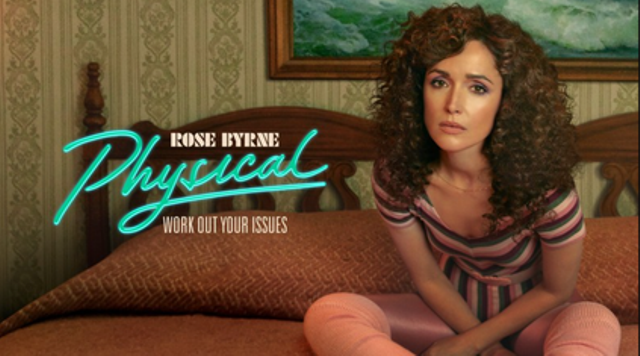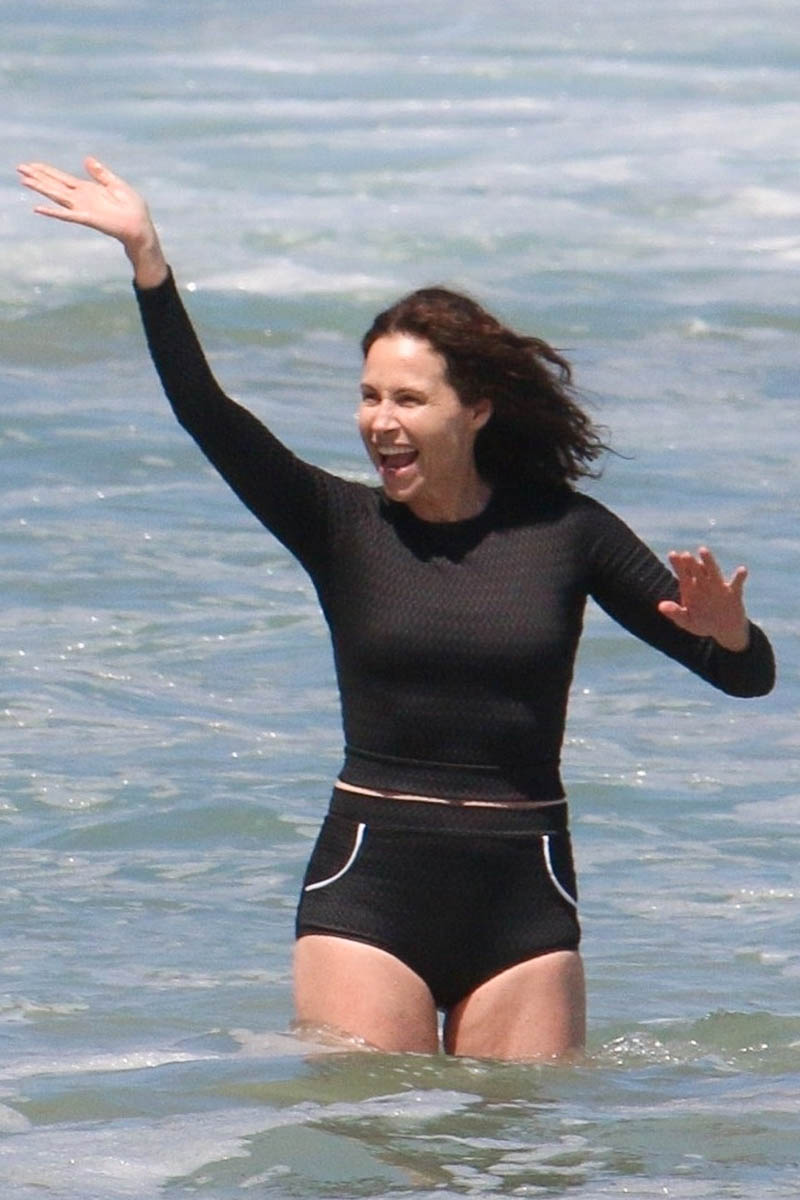Rose Byrne in Physical



Warning for discussion of eating disorders/bulimia and self-harm
Physical, the new Apple TV+ series starring Rose Byrne as an aerobics guru, is about as anti-nostalgic as a period piece can be (as someone born in the 1980s, it crushes my soul that this now qualifies as “period piece”). It’s 1981 and Ronald Reagan has been sworn in as president, the hippie generation is segueing into yuppiedom, and Sheila Rubin (Byrne) is trapped in a woman’s duality, her inner self and outer self almost completely disconnected. A once-promising college student, Sheila hitched her wagon to Danny (comedian Rory Scovel), an organizer in “the movement” turned college professor turned failure turned potential political candidate. Whatever affection Sheila once had for Danny is long gone and all that remains is sheer will to not admit defeat. Sheila has poured all her considerable energy and intellect into being Danny’s Wife, supporting him in his failed academic career and then pivoting on a dime to help him launch a campaign for state assembly based on taking on a local real estate developer whose building projects threaten the halcyon shores of Southern California, all while caring for their daughter, Maya.
Sheila’s façade is solid enough that no one around her notices the cracks turning into gaping canyons in her psyche, but as the audience, we are treated to Sheila’s constantly running inner monologue, a ruthless screed of self-loathing and painful justifications and empty promises as Sheila struggles with bulimia. There’s no way around it, Physical is a BRUTAL watch, especially if you have experience with disordered eating. The false validations, the promises to “do better tomorrow” and “this is the last time”, the ritualization of the harmful behavior, hiding the harmful behavior behind extravagant ruses—Physical captures the cycle of disordered eating in excruciating detail. Sheila so clearly lacks control in her own life that she exerts extreme control on her body, emotional eating followed by self-destructive purging and all of it set to the soundtrack of Sheila’s self-excoriating thoughts. It can be very hard to take, so it’s for the best that after the first three episodes premiered on Apple TV+ over the weekend, the rest of the series will drop in weekly installments. This is not, for lack of a better term, a binge.
Though it is bleak, Physical offers some catharsis, too. For instance, episode three, “Let’s Get Down to Business” (directed by Stephanie Laing and written by Rosa Handelman), features a scene between Sheila and Greta (Dierdre Friel), a fellow housewife, though one with considerably more resources than Sheila. Still, Greta is miserable in many of the same ways. She perceives many of the same failings and emotionally eats in a way similar to Sheila, though Greta’s relationship to food and exercise is considerably different. Overweight and frumpy, Greta sticks out at aerobics class and indeed, has a breakdown afterward because she knows she doesn’t fit into the world of spandex and leotards. It is actually painful to see Greta and Sheila come so close to mutual understanding, but Sheila, unequipped and not ready to admit her issues out loud, lets the moment slide and continues to maintain her façade of a woman who finds empowerment in exercise.
Physical touches on the extremely complicated relationship women have with our bodies, fitness vs. health, food, and image, and even though the show is set in the 1980s, it’s easy to see how these cycles continue today in our supposedly more body positive culture. Sheila shouting at her aerobics class to “own your pain” and “let it fuel you” could be any screaming Peloton or Soul Cycle instructor today, and despite a move toward more inclusive images, women are still pressured to conform to specific body stereotypes. But Physical doesn’t hit you over the head with any of this, it doesn’t need to because as portraits, the women of Physical are so clearly drawn, the parallels present themselves naturally. Besides Sheila and Greta, there is also Bunny (Della Saba), whose bottle-blonde hair, blue eyeshadow, and ass-kicking aerobics routine first catches Sheila’s eye. Sheila sees in Bunny something Sheila wants to be, and so, despite a rocky start to their relationship, she finagles a place teaching at Bunny’s aerobics studio. Aerobics is Bunny’s ticket to the American dream, which naturally makes her a stepping stone for Sheila.
The cross-section of health and commerce is another aspect of Physical that echoes today’s multi-billion-dollar wellness industry. We know as viewers how unwell Sheila is, that she should not be selling anyone an idea of healthy fitness, but she is cashing in on aerobics, contributing to a diet culture that still has a stranglehold on American women today, and she is also not so politically pristine as she may have been in her younger years. She gets involved with John Breem (Paul Sparks), the appropriately dorky Mormon developer her husband is using as a prop for his nascent political career. Breem represents the seemingly antithetical nexus of another faction of American culture, the crossroads of the “family values” set and unbridled commerce. He’s all wholesome family goodness and faith, but he wants Sheila, despite being married himself, and his shopping malls are crushing the local mom-and-pop shops men like Breem bemoan the death of today. No one needs to call Breem a hypocrite out loud, we know this archetype of American success very well.
Physical is grounded in the tensions of appearance, of how hard everyone works to project images crafted for the consumption of others at the expense of our own personal health and wellbeing. Sheila is a self-hating wreck, literally swallowing and expunging her misery in a destructive cycle; Greta is similarly miserable, but she holds everything within so tightly it seems like she might explode; Danny is trying to overcome the burgeoning knowledge of his own pointlessness in an equally pointless political crusade; and John Breem is All American Values except for destroying small business and also wanting to f-ck a married lady outside of his own marriage. All of these people are detestable in different ways, though Sheila and Greta, and to a lesser extent Bunny, are dealing with real mental health issues for which the 1980s barely have a lexicon. Even at her worst, Sheila’s illness is never far away, though Physical never actively solicits pity for her.
This is a difficult show to watch, and it’s way more “dark” than it is “comedy”, but it’s also a crystal clear mirror on how little has changed in diet culture and the pursuit of fitness in the last 40 years. Sheila is balancing the same demands of womanhood and motherhood, trying to be supportive to a spouse who doesn’t value her, and punishing herself when she perceives shortcomings in her impossible balancing act. Sheila is a cruel person, to herself and others, but the tone of Physical isn’t cruel, it’s almost sad. This is a world in which everyone is constantly falling short of impossible standards, and the ways in which that world echoes the real one are chilling. The fitness fads have changed, but virtually nothing about the pressures and expectations facing Sheila have. That’s the real horror of Physical. Our lexicon is a lot bigger and more sensitive than the one Sheila has in the 1980s, but very little else is different about the world then and now. Change the soundtrack, trade the leotard for yoga pants and big hair for crown braids, and Sheila could be any fitness influencer today.
The first three episodes of Physical are streaming now on Apple TV+. The remaining seven episodes will drop weekly on Fridays.

